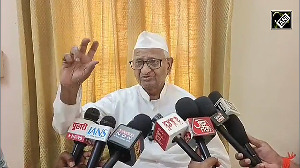As expected, President General Pervez Musharraf of Pakistan announced a major reshuffle of the senior officers of the Pakistan army of the rank of generals and lieutenant generals on October 2 and 3.
The reshuffle was necessitated by the impending retirement of General Mohammad Aziz Khan as chairman, joint chiefs of staff committee, and General Muhammad Yusuf Khan as vice-chief of the army staff, both on October 7.
With the retirement of General Mohammad Aziz Khan, a Kashmiri belonging to the Sudan tribe, from the army, the Pakistan army does not have any identified fundamentalist officers in the rank of lieutenant general/general.
When Musharraf seized power on October 12, 1999, the army had two identified 'fundos' in the rank of lieutenant general -- Mohammad Aziz Khan, who was then the chief of the general staff and Muzaffar Usmani, the then corps commander, Karachi.
Subsequently, Musharraf appointed Mohammad Aziz Khan as commander of one of the two corps in Lahore and Usmani as deputy chief of the army staff. It was the triumvirate of Usmani as corps commander, Karachi, Mohammad Aziz Khan as the CGS and Mahmood Ahmed, as the then corps commander of Rawalpindi, which staged the coup against Nawaz Sharif, the then prime minister, in Musharraf's absence from the country and paved the way for his installation as the military dictator with the designation of chief executive. They refused to accept Nawaz Sharif's order dismissing Musharraf as chief of the army staff and appointing Lieutenant General Ziauddin, the then director general of the Inter-Services Intelligence, in his place. They had both Nawaz Sharif and Ziauddin arrested.
After taking over, Musharraf appointed Lieutenant General Mahmood Ahmed as the DG of the ISI. After 9/11, the US reportedly exercised pressure on Musharraf to ease out all the three from sensitive posts before the US military operations against Al Qaeda and the Taliban commenced on October 7, 2001. The US did not trust Usmani and Mohammad Aziz Khan because of their proximity to Islamic fundamentalist parties. It was annoyed with Mahmood Ahmed because of his failure to pressurise Mulla Mohammad Umer, the amir of the Taliban, to hand over Osama bin Laden to the US.
Musharraf had Usmani and Mahmood removed on October 7, 2001. They went on premature retirement. He could not remove Mohammad Aziz Khan from the army because of his Kashmiri background,his popularity amongst the fundamentalist parties and jihadi organisations and his role in orchestrating the jihad against the Indian army in Jammu and Kashmir. He removed him from Lahore, promoted him as a four-star general and appointed him to the largely powerless post of chairman, joint chiefs of staff committee.
To reassure the fundamentalist parties and the jihadi organisations that his being kicked upstairs would not involve any dilution of Pakistani support to the jihad in J&K, he told them that even after his new appointment he would continue to handle the jihad in J&K.
Usmani, though a fundamentalist like Aziz, was not as popular as Aziz amongst the fundamentalist organisations. Musharraf did not, therefore, have to worry about any negative consequences of his removal.
Even after Aziz retires on October 7, Musharraf has to keep a wary eye on him. Because of his role in the Kashmiri jihad and in helping the Taliban, Aziz is very popular amongst the lower ranks of the army. Some junior army officers and a Kashmiri belonging to the same Sudan tribe as Aziz and hailing from the same village in Pakistan-occupied Kashmir as Aziz, who were arrested following the first unsuccessful attempt to assassinate Musharraf last December, were reported to have stated during the interrogation that they wanted to kill Musharraf not only because of his betrayal of the Taliban and Al Qaeda, but also of Aziz. The Kashmiri detenu reportedly accused Musharraf of preventing a Kashmiri (Aziz) from becoming the COAS for the first time in Pakistan's history, by giving himself an extension.
Musharraf might find himself compelled to reassure the jihadis once again that Aziz's retirement would not mean any change in his Kashmir policy. There is already speculation in Pakistan that he might appoint Aziz as president of PoK, replacing Major General Mohammad Anwar Khan (retd), the present president, who is Aziz's cousin or nephew.
Ehsanul Haq, who succeeds Aziz, is believed to be a Pashtun. He is a close friend of Qazi Hussain Ahmed, the amir of the Jamaat-e-Islami, but is not a fundamentalist himself. In 2001, when Musharraf accepted an invitation from then prime minister Atal Bihari Vajpayee, to visit India for the Agra summit, the qazi was strongly critical and refused to attend an all-party meeting convened by Musharraf before going to India. Ehsanul Haq, then a corps commander at Peshawar, met the qazi at Musharraf's request and persuaded him to support Musharraf's decision to visit India.
After taking over as DG, ISI, he came under some suspicion in February 2002, when Omar Sheikh, one of the principal accused in the murder of journalist Daniel Pearl, reportedly told the Karachi police during the interrogation that during a visit to Kandahar before 9/11 to meet bin Laden, he had come to know of Al Qaeda's plans for the 9/11 terrorist strikes and had mentioned this to Ehsanul Haq at Peshawar on his return. Omar Sheikh's allegation did not affect Ehsanul Haq's position as the DG, ISI.
The US was reported to have been quite happy with his stewardship of the ISI for three years during which some pro-jihadi officers were eased out of the directorate and many key Al Qaeda operatives, who had taken shelter in Pakistan, including Khalid Sheikh Mohammad, were arrested by the ISI and handed over to the Federal Bureau of Investigation. At the same time, there was concern over his perceived inaction against Taliban leaders operating from Pakistani territory. This, however, did not affect the US' overall positive assessment of him.
Keeping this in view, one would have expected Musharraf to appoint him as the VCOAS, in which capacity he would have continued to supervise and coordinate the functioning of the ISI.
The post of the chairman of the joint chiefs of staff committee to which he has been appointed is a largely paper-rich post involving medium and long-term assessment of the needs of the military, preparing and revising operational plans etc and does not involve important executive and operational responsibilities.
Unless Musharraf has reassured the US that Ehsanul Haq would continue to be actively involved in the operations against Al Qaeda, his being shunted up to this post could mean his marginalisation for the next three years before he quits the army.
It is not clear whether General Ahsan Saleem Hayat, the new VCOAS, who will assist Musharraf in the day to day running of the army and ISI and in supervising the anti-Al Qaeda operations, is a Punjabi or a Mohajir. He is senior to Ehsanul Haq, having been commissioned in 1967 in the armoured corps, whereas Ehsanul Haq was commissioned in 1969 in an army air defence regiment.
Genmeral Hayat is known for his personal loyalty to Musharraf and his proximity to the US. These two factors would seem to have played a role in the June 10 attempt to assassinate him at Karachi by the Jundullah (the Army of Allah), a new organisation, which is a member of the Inmternational Islamic Front.
Not much is known about Lieutenant General Ashfaq Kiani, the new DG of the ISI. He had also served in the past as the DG of military operations, an important post from the point of view of anti-Al Qaeda operations.
Mohammad Aziz Khan and Muhammad Yusuf Khan owed their promotions as lieutenant generals to Nawaz Sharif and not to Musharraf. With them out of the way and the supersession and consequent premature retirement of six others, all the serving lieutenant generals owe their rise above the rank of brigadier personally to Musharraf. He may therefore be confident of their personal loyalty to him.
There is unlikely to be any opposition from them to his giving himself another extension as the COAS or any heartburn over it. The opposition to it is mainly from the political parties and sections of the public. While it is certain that with US backing for his decision, Musharraf will continue to wear the second hat of COAS after December in violation of his formal commitment to the political parties to resign from that post, the events leading to his decision are not proceeding as he had expected them to.
He was planning to have resolutions passed by the federal Parliament and the legislative assemblies of the four provinces requesting him to continue as the COAS too in Pakistan's supreme national interest. The provincial assemblies of Sindh and Punjab have already done so and there should be no problem in getting similar resolutions passed by the federal parliament, which he controls through the Pakistan Muslim League (Quaid-e-Azam) and the defectors from Benazir Bhutto's People's Party.
However, he has been facing difficulty in the North-West Frontier Province and Balochistan. The NWFP assembly, which is dominated by the fundamentalists, has opposed his continuing as the COAS. In the Balochistan a assembly, where the fundamentalists have a large but not dominating presence, his supporters have not yet been able to have their way.
The fundamentalist parties, who feel cheated by him on this issue, have organised a series of rallies to oppose his continuing as the COAS. Reliable reports from Pakistan say the response to their rallies on this issue has been disquietingly (to Musharraf) large in the NWFP, reflecting the continuing Pashtun anger over his cooperation with the US against the Taliban and Al Qaeda.
Musharraf does not, however, have to worry over the protests of the political parties opposed to him and the fundamentalists, so long as he has the support of his army officers and the US. Unless the public protests against him gather unexpected momentum, as had happened under Ayub Khan, which seems unlikely at present, he should have no concerns over any negative public reaction to his violating his commitment on the COAS issue.
If at all there is any threat to Musharraf's position, it is likely to come not from the senior officers, but from junior officers not only in the army, but also in the air force. As admitted by Musharraf in a television interview in June, the investigations into the two attempts to kill him last December have revealed the involvement of junior non-commissioned officers of the army and air force. Any future threat to his position would come mainly from that level and not from a senior level in the form of another conspiracy to kill him.
There is some penetration of jihadi organisations into the army and air force at the lower and middle levels and there is anger against Musharraf at those levels because of his cooperation with the US against Al Qaeda and the Taliban and in the anti-proliferation investigation against Dr A Q Khan, the father of Pakistan's atomic bomb. There is also considerable anger amongst the Shias in the armed forces over his inability to stop the massacre of Shias by Sunni terrorists.
Since he took over power, there have been 40 massacres of Shias in different cities of Pakistan. Such a large number of anti-Shia massacres had not taken place under any other previous leader. Any threat to him would come from these sections.
The new promotions and postings mark the ascent of a new generation of officers, who distinguished themselves not in battles against India over Kashmir or in the covert jihad against Soviet troops in Afghanistan ostensibly to protect Islam, but in the so-called war against Al Qaeda to protect American lives and promote US interests. The fact that they did well in this war might be a good performance in the eyes of the US political leadership and policy-makers, but not in the eyes of large sections of Pakistani public opinion.
Lieutenant generals promoted as four star generals
- Lieutenant General Ehsanul Haq, Chairman, Joint Chiefs of Staff Committee. He replaces General Mohammad Aziz Khan, who retires on October 7. He was the DG of the ISI, till his promotion.
- Lieutenant General Ahsan Saleem Hayat, Vice-Chief of Army Staff. He replaces General Muhammad Yusuf Khan, who also retires on October 7. He was the corps commander, Karachi, till his promotion and survived an assassination attempt by the International Islamic Front on June 10.
Lieutenant generals reshuffled
- Lieutenant General Ashfaq Kiani. Replaces Ehsanul Haq as DG, ISI. He was corps commander, Rawalpindi.
- Lieutenant General Shahid Hameed, corps commander, Quetta, posted as commandant, National Defence College on retirement following supersession of Lieutenant General Wasim Ghazi.
Major generals promoted to lieutenant general
- Lieutenant General Syed Ather Ali, corps commander, Karachi.
- Lieutenant General Mohammad Afzal Muzaffar, corps commander, 2nd Strike Corps, Multan.
- Lieutenant General Hamid Rabnawaz, corps commander, Quetta.
- Lieutenant General Salahuddin Satti, corps commander, Rawalpindi.
- Lieutenant General Mohammad Sabir, corps commander, Gujranwala.
- Lieutenant General Imtiaz Hussain will continue as director-general, weapons and equipment, on his promotion.
- Lieutenant General Wasim Ashraf appointed as adjutant-general to succeed Lieutenant General Faiz Gillani, who retires this month.
Lieutenant generals who retired on being superseded
- Lieutenant General Mohammad Akram. He was corps commander, 2nd strike Corps, Multan.
- Lieutenant General Javed Hasan. He was corps commander, Gujranwala. During the Kargil conflict, he was in charge of the operations as Commander FCNA (Force Command Northern Areas). He has been superseded reportedly because of his poor performance, which led to the death of hundreds of Pakistani soldiers at the hands of the Indian Army.
- Lieutenant General Munir Hafeiz, Chairman, National Accountability Bureau. He is to retire from the army on October 30, on reaching the age of superannuation, but will continue as Chairman, NAB, in a civilian capacity till October 2005 when his tenure in that post expires.
Lieutenant Generals who have been superseded, but will continue in their present posts
- Lieutenant General Hamid Javed, currently chief of staff with General Musharraf. He is already under extension for a year after reaching the age of superannuation. He has never held an independent charge of a corps and, hence, was not eligible for consideration for promotion.
- The position of Lieutenant General S P Shahid, corps commander, Bhawalpur, who has also been superseded is not clear. Since no one has been appointed in his place, it is possible that, despite his supersession, he has chosen to continue in the post till his date of superannuation on April 30, 2005.






 © 2025
© 2025